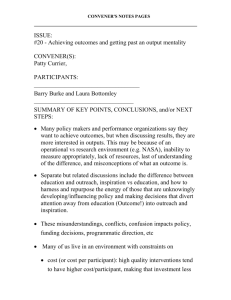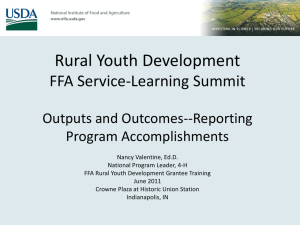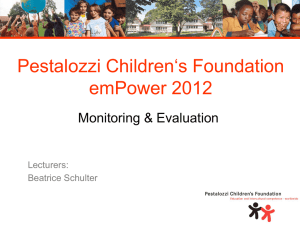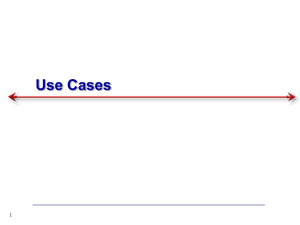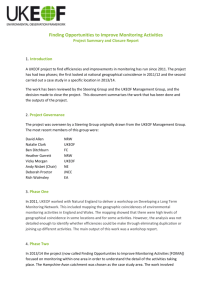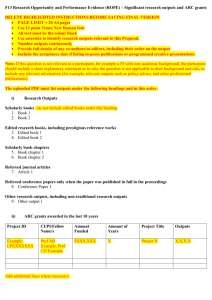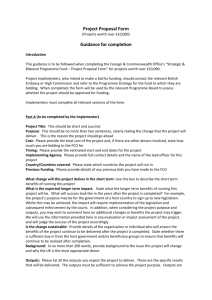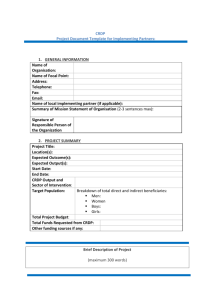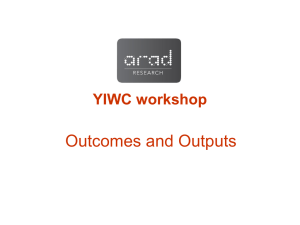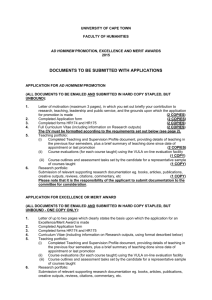NGO Outout Funding Presentation
advertisement
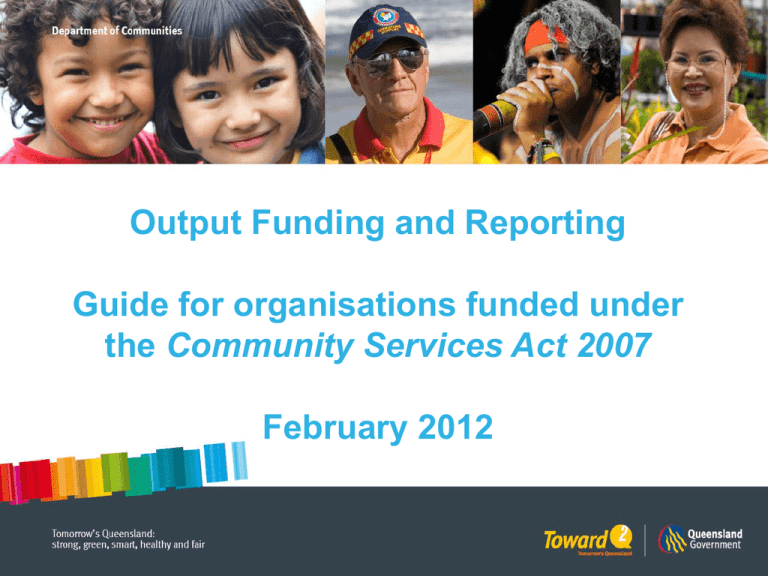
Output Funding and Reporting Guide for organisations funded under the Community Services Act 2007 February 2012 What is an Output? An output is a product or a service generated from using resources Service providers transform resources (inputs) into services (outputs) and the impact of these outputs on individuals, groups and the community are the outcomes of the service Why is it being introduced? • Qld Audit Office Report 2007 • Service Delivery Commission Report 2007 • Qld Compact 2009 • Red Tape Reduction Initiative 2009 • Machinery of Government changes 2009 • Productivity Commission • Sector feedback Why is it being introduced? Part of a suite of reforms currently underway to better support the relationship between government and NGOs – Common Service Agreement – Harmonising quality standards – Output funding and reporting – Common Funding Legislation – Review of performance measures What is Output Funding? Clarifies: • What is being purchased • How much is being paid for it, and • What will be delivered What Outputs does the Department fund? • The Outputs Catalogue contains the outputs the department funds • Maps to National Classification for Community Services (NCCS) - enables national comparisons • Contains the specific measures for each output On Internet: http://www.communities.qld.gov.au/gateway/fundingand-grants/output-funding-and-reporting Output Measures • Each output has an associated output measure • Allows service providers to clearly indicate the quantity of outputs they deliver • Types of output measures Hours Places Milestones achieved on agreed plan Meals Kilos of food delivered Collecting data on hours of direct service delivery Count this time as part of hours of service/output Time spent with clients/service users/community, for example, in person or on the phone: Counselling Case management Personal assistance Time on the phone with clients Time spent on behalf of a client or which can be attributed to a client: Arranging a referral Writing file notes Participating in case conferences Recording data at time of assessment Mobile service delivery Preparing training materials Time on behalf of or available for clients (output specification) Not counted in hours of service Indirect time: Team meetings Travel Training Networking meetings Getting supervision Compiling or entering data for reporting purposes Collating data Administrative tasks Supervising staff All included in establishing cost Items to take into consideration in estimating the hours of direct service delivery Estimating the hours that are available for direct service delivery for each position may include: • How many staff are providing direct service delivery (expressed as equivalents of full time positions) • How many hours of the week are involved in activities that are direct service delivery • How many weeks per annum are available for direct service delivery for each position Output Measure – Clients • Services will need to report on the number of clients (distinct individuals) who received a service under each funded output during the reporting period • Some services will also be provided with an annual target number of clients for each funded output Output Measure - Places • A Place is defined as the number of occupied or potentially occupied spaces for clients who can be provided with a service • A unit of accommodation may be a bed, a bedroom, a flat or a house Output Measure - Places • Annual total number of places available is the number of accommodation units multiplied by the number of nights per annum • Units of accommodation may be temporarily unavailable (due to repairs and maintenance, critical incident etc.) however, the annual total quantity of places is NOT adjusted in these circumstances Output Measure – Milestones achieved on agreed plan Milestone categories – • Plan / schedule • Projects • Forums / conferences • Workshops • Reports / papers • Resources / tools • Community events • Training / learning and development • Sector development and collaboration NGO reporting requirements Through OASIS (as per reporting frequency in service agreement) • Financial Acquittals • Performance reports (will change and may decrease in number depending upon output applied) • Annual audited statements • Any other reports required in the service agreement • Reporting against the agreed number of outputs • For each output, reporting on the number of clients (distinct individuals) who received a service NGO reporting requirements Number of outputs delivered using the appropriate measure Number of clients (distinct individuals) provided with the service Funded Output Output Description Output Measure Quantity to be delivered per annum A01.2.02 Needs assessment and management of case/service plans Activities of assessment of service needs, development and monitoring of service plans, ongoing case management and coordination of voluntary, individualised service packages, and professional support in accessing and using general community services. Hours <Insert negotiated Output Quantity> Number of clients <Insert target number of clients> OR Insert text <Report on number of clients (distinct individuals) who received a service against this output> Reporting Frequency Due Date Reporting in OASIS Reporting in OASIS Support available Department of Communities internet site: • http://www.communities.qld.gov.au/gateway/f unding-and-grants/output-funding-andreporting Includes frequently asked questions

